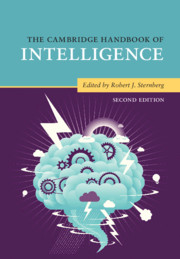Book contents
- The Cambridge Handbook of Intelligence
- The Cambridge Handbook of Intelligence
- Copyright page
- Dedication
- Contents
- Figures
- Tables
- Contributors
- Preface
- Part I Intelligence and Its Measurement
- Part II Development of Intelligence
- Part III Intelligence and Group Differences
- Part IV Biology of Intelligence
- Part V Intelligence and Information Processing
- Part VI Kinds of Intelligence
- 27 The Theory of Multiple Intelligences
- 28 The Augmented Theory of Successful Intelligence
- 29 Emotional Intelligence
- 30 Practical Intelligence
- 31 Social Intelligence
- 32 Collective Intelligence
- 33 Leadership Intelligence
- 34 Cultural Intelligence
- 35 Mating Intelligence
- 36 Consumer and Marketer Intelligence
- Part VII Intelligence and Its Role in Society
- Part VIII Intelligence and Allied Constructs
- Part IX Folk Conceptions of Intelligence
- Part X Conclusion
- Author Index
- Subject Index
- References
33 - Leadership Intelligence
from Part VI - Kinds of Intelligence
Published online by Cambridge University Press: 13 December 2019
- The Cambridge Handbook of Intelligence
- The Cambridge Handbook of Intelligence
- Copyright page
- Dedication
- Contents
- Figures
- Tables
- Contributors
- Preface
- Part I Intelligence and Its Measurement
- Part II Development of Intelligence
- Part III Intelligence and Group Differences
- Part IV Biology of Intelligence
- Part V Intelligence and Information Processing
- Part VI Kinds of Intelligence
- 27 The Theory of Multiple Intelligences
- 28 The Augmented Theory of Successful Intelligence
- 29 Emotional Intelligence
- 30 Practical Intelligence
- 31 Social Intelligence
- 32 Collective Intelligence
- 33 Leadership Intelligence
- 34 Cultural Intelligence
- 35 Mating Intelligence
- 36 Consumer and Marketer Intelligence
- Part VII Intelligence and Its Role in Society
- Part VIII Intelligence and Allied Constructs
- Part IX Folk Conceptions of Intelligence
- Part X Conclusion
- Author Index
- Subject Index
- References
Summary
Leaders matter to organizational performance and adaptability. Effective leaders matter the most in a dramatic and positive manner. This chapter is really about the role of intelligence in leadership, not the claim that the capability to be an effective leader is a distinct individual characteristic or a type of intelligence. Intelligent leadership, therefore, is leadership in which a person uses many forms of intelligence: cognitive, practical, emotional, and social intelligence. The chapter also examines how the role of the unconscious motive of the Need for Power, a sense of purpose, values, style and the quality of relationships (in terms of shared vision, compassion, and energy) are essential to effective leadership. There is also a brief review of the dark side of leadership.
Keywords
- Type
- Chapter
- Information
- The Cambridge Handbook of Intelligence , pp. 802 - 819Publisher: Cambridge University PressPrint publication year: 2020
References
- 1
- Cited by

